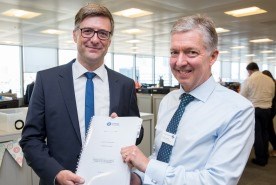Poole, 2018-Jun-28
This ten-year programme of work will be delivered in three distinct phases. Phase one will see the development of a new, cloud-hosted traffic control solution by Siemens. This will replace the existing Urban Traffic Control (UTC) system, which has been in service in TfL for many years, with a new cutting-edge RTO solution. This development phase will be completed in close collaboration with TfL’s service delivery team, ensuring the solution is engineered to meet the challenges of managing one of the world’s largest and busiest cities.
To help meet these challenges, the RTO development work will build on the core functionality of the current system, and add a number of new features, with the system enabling traffic control to be migrated into the future-proof, cloud environment during 2020.
Phase two of the project will run in parallel with the RTO development work and will see all new adaptive control algorithms being developed (currently referred to as ‘Future SCOOT’); this phase will be delivered in stages, starting in 2021.
SCOOT is already the world’s most widely used adaptive algorithm technology, with London the largest single user, and on delivery of phase two in 2022, Future SCOOT will provide TfL with a new adaptive algorithm to manage and control the majority of London’s 6,000 traffic intersections. By continuously monitoring approaching traffic and developing accurate indicators of congestion and traffic disruption using a wide range of modern data sources, Future SCOOT will enable a dynamic and reactive traffic control solution for every intersection in the city.
Finally in phase three of the project, which starts when the system first goes live in 2020, Siemens will be responsible for maintaining the system throughout the rest of the contract term.
Glynn Barton, Director of Network Management at TfL, said: “We are pleased to be working with Siemens to deliver a world leading upgrade to our road network management system. The benefits to all Londoners include improved responses to incidents, improved data and better customer information, as well as £1bn of benefits through reducing delays for all road users. The new Real Time Optimiser system will support our Healthy Streets Approach for London, which aims to improve air quality, reduce congestion and make London’s diverse communities healthier, more sustainable and more attractive places to live, work, play and do business.”
Commenting on the contract award, Wilke Reints, Managing Director at Siemens ITS, said: “Having worked in close partnership with TfL on a wide range of traffic solutions in the past, we are absolutely delighted to have been selected to work with them on such an exciting and pioneering programme. This is a major development for London and its road users and for the traffic industry as a whole.
“Given TfL’s clear focus on delivering the safest and most efficient traffic network for all road-users, we believe this is a unique opportunity to build a robust, reliable system that will meet the needs of one of the world’s largest cities. Once RTO is successfully introduced, London will be a showcase for intelligent traffic solutions for megacities worldwide.”
-Ends-


